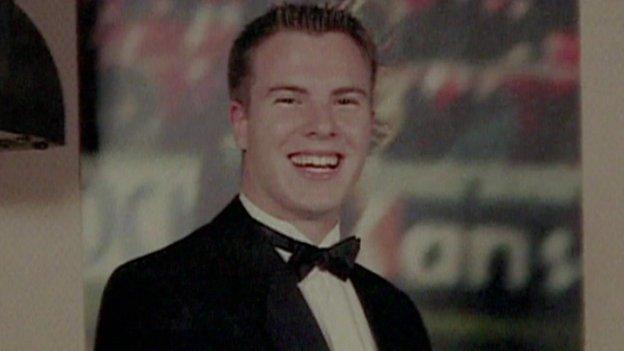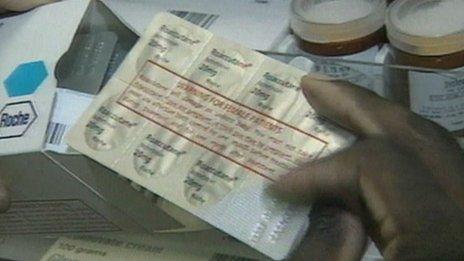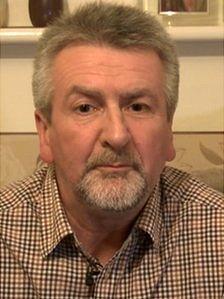Parents lobby MPs for anti-acne drug Roaccutane ban
- Published

Jon Medland, a 22-year-old medical student from Barnstaple in Devon, killed himself three weeks after being prescribed Roaccutane
Parents whose children committed suicide while taking, or after taking an anti-acne medication have been lobbying MPs about the drug.
They believe Roaccutane played a part in their children's deaths and would like to see it banned.
However manufacturer Roche said "no causal link" had been established between Roaccutane and either depression or suicide.
North Devon MP Sir Nick Harvey wants further studies into its side effects.
He has called on the Department of Health to look again at the drug and "evidence" from people who have experienced "psychotic disorders".
A ban, said the Lib Dem MP, could end in court action with the government expected to "demonstrate overwhelming scientific evidence, which I don't believe as yet is available, which is why I am calling as a first step for such scientific research to take place".
'Self-esteem'
One of his constituents, Jonathan Medland from Barnstaple, has been fighting to have Roaccutane banned for 10 years.
His son Jon, a 22-year-old medical student at Manchester University, hanged himself weeks after being prescribed the drug to treat spots on his back.
His inquest did not find Roaccutane responsible, but Mr Medland said it played a part and he is determined to keep fighting.
He said his son was an "exuberant" character who had never, to his knowledge, suffered from depression.

Roche said 17 million people worldwide have been treated with the drug
"I'm not going to shut up until the drug is taken off the market - however long it takes," he said.
Roche said 17 million people worldwide had used Roaccutane - a brand name for isotretinoin - and no causal link has been established between the medication and either depression or suicide.
"Severe acne can cause some sufferers to become depressed and can also affect their mood and self-esteem," a statement said.
"This is why the information provided with Roaccutane carries a warning that some patients may experience mood changes or an increase in depression."
The manufacturer said it should only be prescribed and patients being treated for signs of depression should be monitored.

Jonathan Medland wants Roaccutane taken off the market
It added that information inside packs of Roaccutane, advised patients to tell their doctor if they noticed changes in mood or behaviour.
Last October, 16-year-old Jack Bowlby from Wantage in Oxfordshire, killed himself at Cheltenham College.
His inquest was told he experienced "dark thoughts and violent mood swings" after taking Roaccutane.
Dr Graham Mould, a consultant pharmaceutical forensic toxicologist, said there was a "one in 10,000" risk of developing suicidal thoughts while taking the drug.
However Gloucester Coroner Tom Osbourne recorded an open verdict, saying there was "insufficient evidence" to prove Roaccutane caused the death.
Jack's parents, Michael and Mandy Bowlby, who were also in Westminster, still believe the drug was a factor.
They said they want more scientific research to be carried out - to help warn other families of the risks.
The Medicines and Healthcare Products Regulatory Agency (MHRA) said "no medicine is without risk and Roaccutane is no exception".
It said in the past 30 years, 43 suicides had been recorded, however these could not definitively be linked to the drug.
"Since it was licensed in the UK in 1983, the MHRA has kept the safety of Roaccutane under close review," a spokesman said.
"Roaccutane is an effective treatment for the most severe forms of acne which have failed to respond to other treatments.
"It has important side effects and must be prescribed by, or under supervision of, a consultant dermatologist".
Other parents campaigning against the drug include Melvin and Lorraine Silcock, from Sittingbourne in Kent, whose 26-year-old son James died in December 2012.
He was prescribed Roaccutane 10 years before his death and although it improved his acne, Mrs Silcock said he "did not feel right" and attributed it to the drug.
Days after watching a documentary about Jesse Jones, 24, from Dorset, who killed himself after taking Roaccutane, he committed suicide himself.
In a note, he said the drug had brought him hell and left his world in tatters.
- Published18 July 2013
- Published5 July 2013